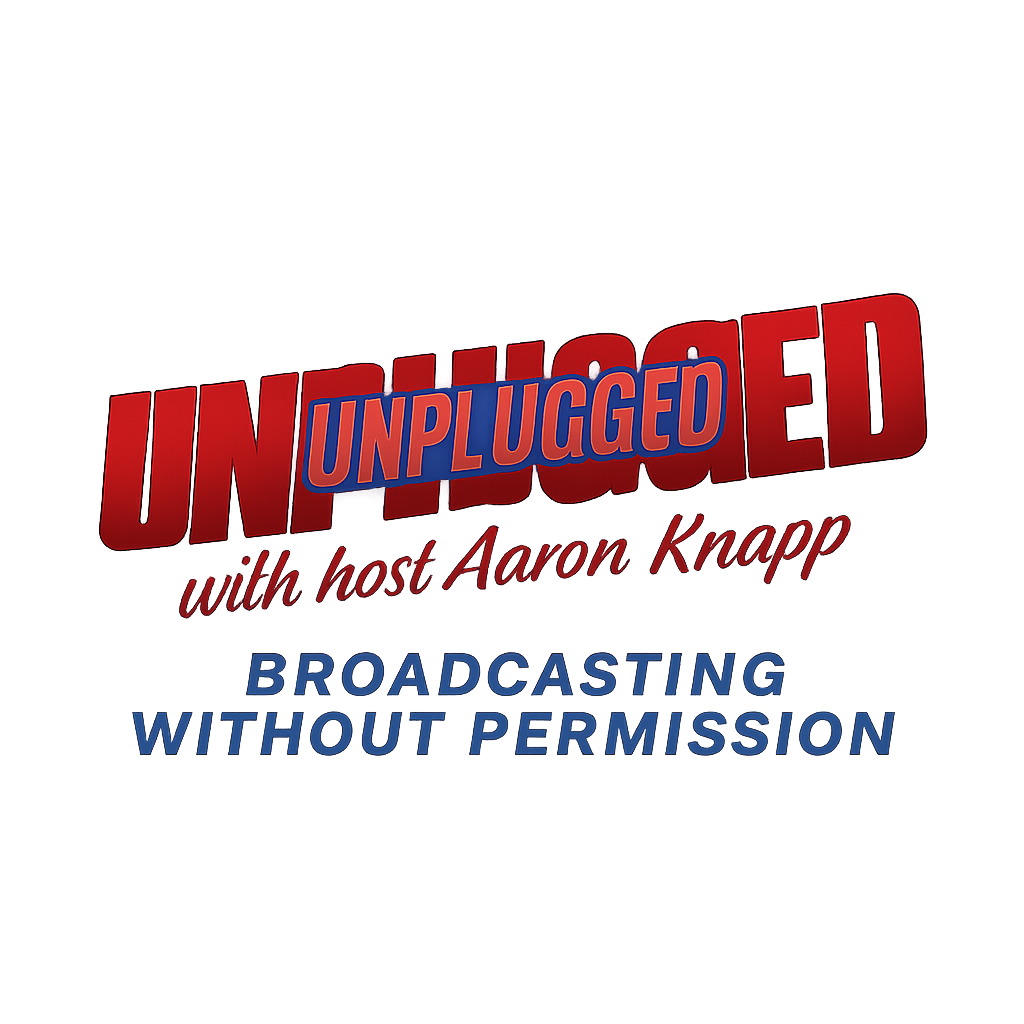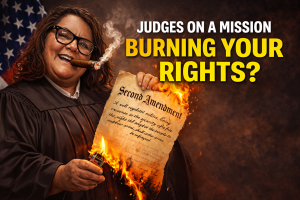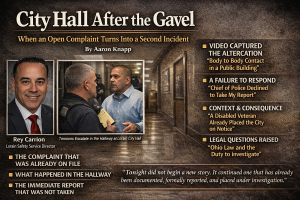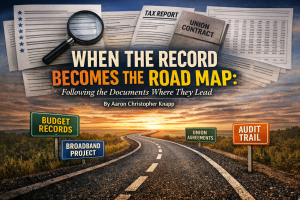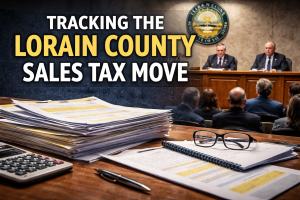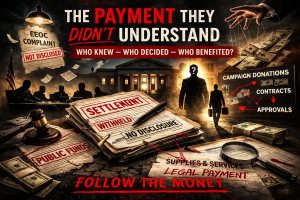“I Need a Dirty Cop”: What Chief McCann’s Words Reveal About Power, Loyalty, and Corruption in Lorain
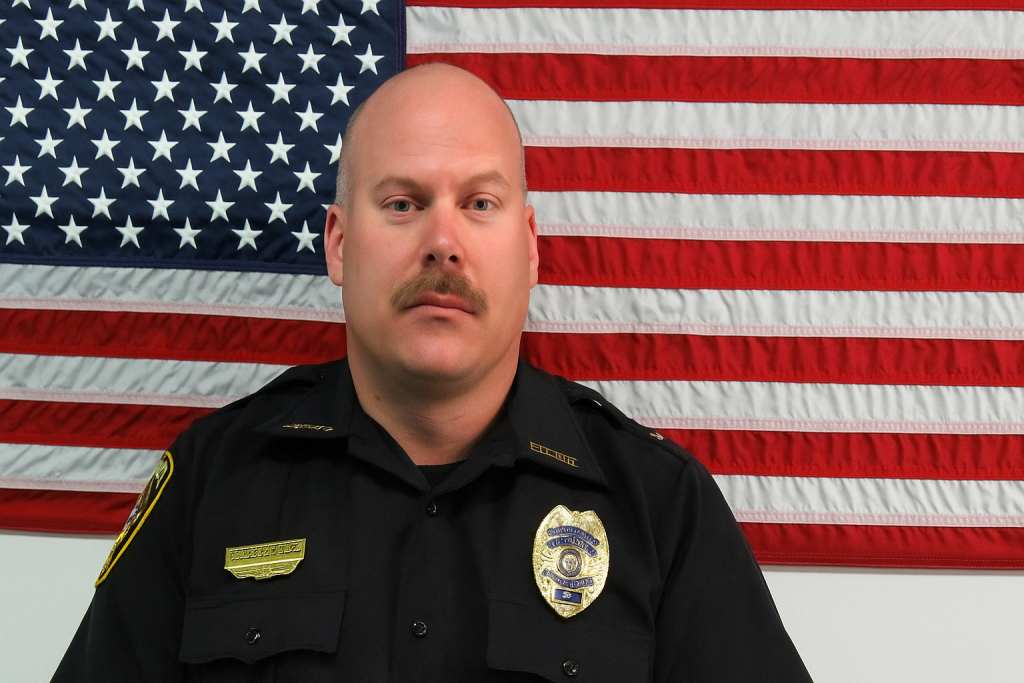
AI Generated
By Aaron C. Knapp Independent Investigative Journalist, Lorain Politics Unplugged
Apr 22, 2025
A corrected and expanded exposé based on internal OPS investigation transcripts
Note: This is a revised version of a previously published piece that mistakenly attributed the statement “I need a dirty cop” to Chief McCann speaking to Officer Miguel Baez. The corrected record, based on sworn interview testimony, confirms that this statement was made to Current LPD Detective Craig Paine. We regret the error and present here a fully annotated, evidence-based rewrite with proper attribution and extended analysis.
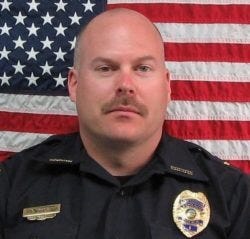
Thanks for reading Aaron’s Substack! Subscribe for free to receive new posts and support my work.
I. The Statement That Shook the Department
When a Chief of Police says, “I need a dirty cop,” the implications ripple far beyond the walls of any one meeting room. According to sworn interview testimony from retired Lorain Police Department member Craig Paine, that’s exactly what Chief James McCann said—loudly and unapologetically—in a hallway before a formal event. The moment wasn’t offhand. It was part of a tirade in which McCann reportedly yelled, cursed, and declared his supremacy over departmental policies.
“You’re damn f—— right I can do that! That’s my f—— name! I can write them, and I can break them.”
— Chief James McCann, as quoted in OPS Internal Investigation, pg. 227
This isn’t a stray comment from a moment of frustration. It’s a philosophy—a governing principle that reveals not just an individual leader’s lack of accountability but the structural failures of oversight and culture that allow it to continue.
What does it mean for the Chief of Police in a mid-sized American city to openly admit he needs corruption to operate? How far does this mentality reach? And how many lives—careers, reputations, communities—have been affected by this self-serving culture of loyalty over law?
II. Craig Paine and the Context of the Quote
Craig Paine, a detective in the Lorain Police , gave the quote under formal questioning during an Office of Professional Standards (OPS) internal investigation into the department’s handling of race discrimination, retaliation, and chain-of-command abuses. His statement appears in the OPS report surrounding the demotion and disciplinary action against Lt. Corey Middlebrooks.
Paine was not a political player. He was not filing a lawsuit. He is a veteran officer who bore witness to a departmental culture of fear and retaliation. His testimony served as a window into how power operated in quiet, unmonitored spaces—hallways, corners, between meetings—where McCann allegedly made his expectations clear.
According to the OPS transcript, the remark occurred shortly after McCann was dissatisfied with the response of another officer during an internal dispute. Paine’s retelling, verified under the Garrity protections for compelled internal testimony, is both chilling and sobering.
McCann’s declaration—”I need a dirty cop”—came not in jest or frustration, but as a strategic demand. He wanted someone who would follow orders without question, ethics be damned. Paine recalled how the message was unambiguous: loyalty was the only law.
III. What the OPS Investigation Revealed
The OPS report, 383 pages long and compiled by Lt. Kyle Gelenius with legal review from Jonathan Downes, details far more than a single shocking quote. It paints a portrait of a department where retaliation, racial bias, and unchecked power thrive.
The report describes how McCann targeted Black officers like Lt. Corey Middlebrooks for demotion, while tolerating or overlooking similar conduct by white officers. It details patterns of punitive assignments, public shaming, and the weaponization of internal affairs.
In sworn testimony, multiple officers confirmed that speaking up meant being labeled disloyal. Discipline was often arbitrary, and those who did not align with McCann’s authority found themselves written up, demoted, or pushed out. The OPS investigation stopped short of finding racial bias with legal certainty but overwhelmingly documented a command climate rooted in fear and favoritism.
OPS wrote:
“Chief McCann contended that Middlebrooks had reached the ‘Peter Principle.’ … [Yet] Middlebrooks has attempted to shift blame onto Chief McCann, who, in his mind or subconsciously, abandoned and betrayed him.”
Even in this critical analysis of Middlebrooks, the report exposes McCann’s heavy-handed role in shaping outcomes and retaliating against perceived disloyalty.
IV. McCann’s Management Philosophy: Loyalty Over Law
According to the OPS report and interview testimony, McCann’s style is not about rule enforcement or modern policing standards—it’s about dominance. Time and again, the OPS report refers to McCann as “boorish,” “unprofessional,” and “unrestrained.”
OPS stated:
“Chief McCann is often unprofessional in the work environment with his comments, which the Chief would characterize as his ‘style’… OPS is not the Chief’s supervisor. That responsibility falls to the Safety Service Director.”
Despite this admission, the city administration has allowed this style to persist. The Safety Director, Rey Carrion, has reportedly taken no action despite multiple complaints and policy violations. The implicit message: loyalty to McCann will be rewarded, while dissent—especially by Black officers or whistleblowers—will be punished.
This toxic culture is not just a McCann problem; it’s a leadership problem across city government.
V. Dirty Cops and Institutionalized Retaliation
The phrase “dirty cop” doesn’t just mean criminal. It means compliant. It means someone willing to break rules, target enemies, and serve the political interests of their boss. In Lorain, that meant aiding selective prosecutions, leaking personnel files, and issuing questionable reprimands.
Consider what happened to Officer Miguel Baez, who confirmed to colleagues that McCann demanded blind loyalty and punished officers who didn’t deliver it. Baez retired under duress. Lt. Middlebrooks was demoted. Others were reassigned, reprimanded, or frozen out.
Even the OPS investigator, Lt. Gelenius, noted he was in a “precarious position.” He urged the administration to monitor the situation for retaliation. Multiple officers expressed fear of retribution for simply telling the truth.
In McCann’s own words, “I can write the policies, and I can break them.” That is the ethos of a man who sees no limit to his authority—no oversight, no law, only command.
Final Opinion: When Power Protects Itself
What this investigation ultimately reveals is that accountability has no place in a system built on fear and obedience. Chief McCann may not be the only problem, but he exemplifies it. His leadership has been defined not by integrity or transparency, but by punishment, threats, secrecy, and survival.
The OPS report may have concluded that no legal discrimination occurred, but it inadvertently confirmed what so many in Lorain already knew: ethics in this department are optional, accountability is rare, and speaking truth to power comes with a price.
We cannot continue to allow our police department to be led by a man who admits—publicly and proudly—that he needs a “dirty cop.” The people of Lorain deserve better. Our officers deserve better. And if the Safety Service Director, Mayor, and Law Director won’t act, then it’s up to the public to demand a new era of leadership.
The next scandal is already brewing. And if history is any guide, McCann will be at the center of it.
